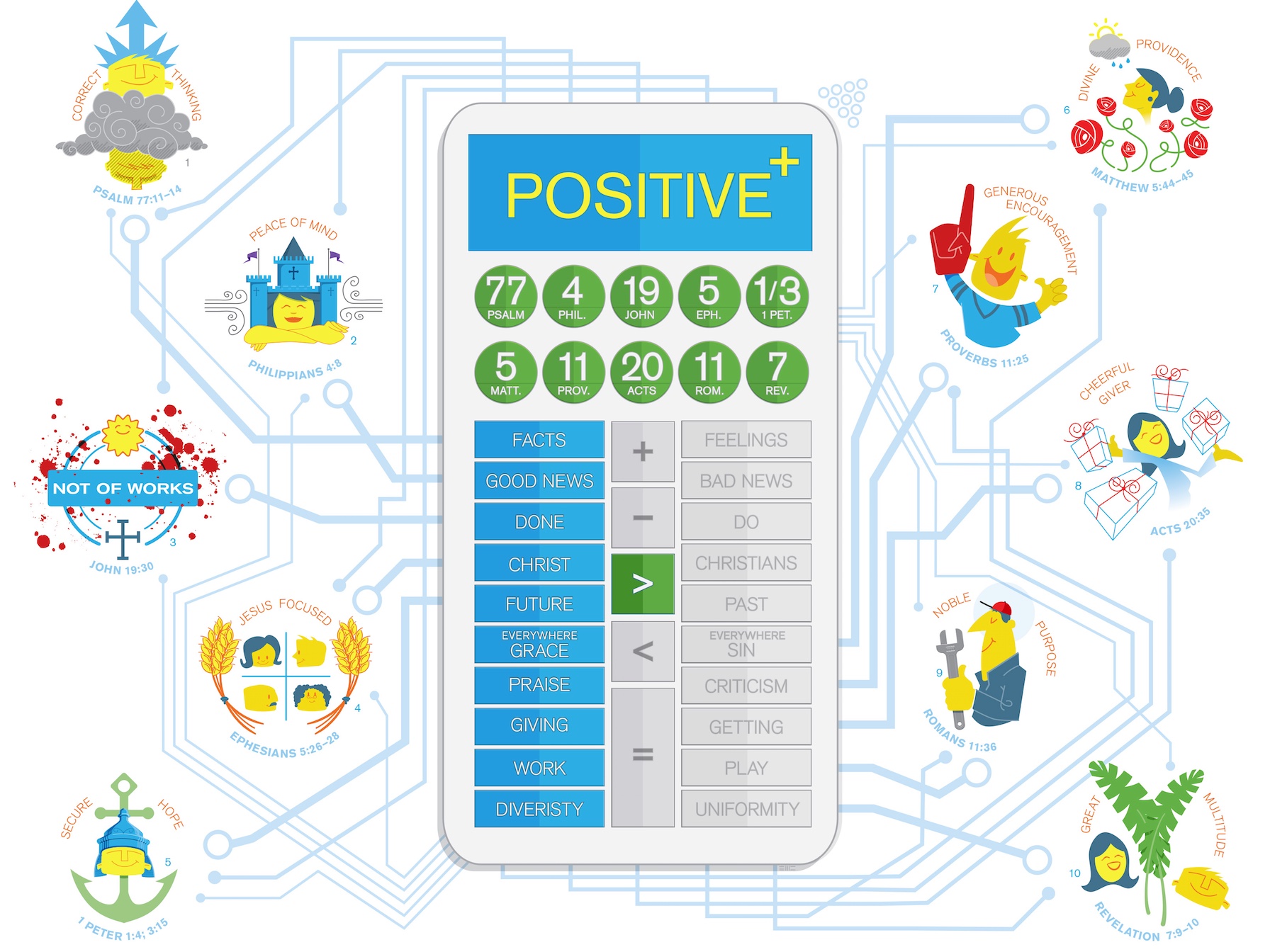
A few years ago, I was reading Gretchen Rubin’s New York Times bestseller, The Happiness Project, where she narrates a year of trying to become a happier person through implementing the research findings of positive psychologists (“happy scientists” as they are sometimes called).
As I read this fascinating and helpful book, I couldn’t help thinking, “Surely Christians can do better than this!” Although these science-based techniques can be helpful, surely Christian have truths that can produce far more joy. Having written Christians Get Depressed Too, I thought, why don’t I write the flip side, “Christians Can Be Happy Too!” (With the bonus that I might be better known as Mr. Happy rather than Mr. Depression!)
The result is The Happy Christian which I based upon 10 biblical formulas, summarized in the above graphic produced by Eric Chimenti. (Here’s full resolution pdf and jpg for printing).
Over the next week or so, we’ll take a closer look at each of these formulas and graphics, but today I thought I’d present a quick summary to give you a general idea of what’s in the book (you can also get the first couple of chapters free at the website here).
Daily Calculations
Just before we look at the formulas, notice that every formula is based upon a Bible verse. You can see that in the texts underneath each image around the calculator and the texts on the green calculator buttons.
Also, every formula is in “greater than” format. For example, the formula Good News > Bad News, based on Philippians 4:8, is saying make an effort to increase your intake of good news and reduce your intake of bad news in order to produce more of God’s peace in your lives. It’s not saying eliminate all bad news – that would be unrealistic and wrong to even attempt in a fallen world.
But, like all formulas, they require work to work! Just as answers to math questions don’t just drop into our laps, so we have to work at these formulas to get the benefit of the biblical truths in them into our lives.
Last, none of these are one-off sums that we calculate once and then move on. They have to be practiced every day of our lives. But I hope the infographic will make it easier to keep them in front of us and keep calculating them until they become instinctive and healthy habits.
Ten Biblical Formulas
1. Facts > Feelings: This chapter covers how to gather the right facts, how to best think about these facts, and how to enjoy the beneficial impact of this on our emotions and moods. After identifying a number of damaging thinking patterns that are pummeling our emotions, a six-step plan to retrain thoughts, knock out destructive emotions, and build a shield of protective positive feelings such as peace, joy, and confidence.
2. Good News > Bad News: Philippians 4:8 is applied to our media and ministry diets to ensure that we are consuming and digesting more good news than bad news, and thus enjoy more of God’s peace in our hearts.
3. Done > Do: While we need the demanding the imperatives of God’s law to reveal where we’ve gone wrong, we need to hear even more of the indicatives of God’s redeeming acts to reveal His grace and provision.
4. Christ > Christians: One of the biggest obstacles to evangelism is the inconsistency and hypocrisy of many Christians. It’s also the reason why so many leave the church or are unhappy in the church. But by focusing more on Christ than on Christians, we stop adding up the innumerable faults of Christians and start calculating the inestimable value of Christ.
5. Future > Past: This chapter helps Christians get the most out of looking to the past without falling into nostalgia or guilt. However, the primary emphasis of this chapter is to encourage Christians to have a much more future-oriented faith than is usually the case.
6. Everywhere grace > Everywhere sin: Without denying the deep and ugly sinfulness that affects and infects everyone and everything, this formula calls Christians to pay much more attention to God’s beautiful work in the world and in all His creatures, resulting in a more positive worldview, more joy in our hearts, and more praise for our gracious God.
7. Praise > Criticism: Although it often feels good to criticize more than praise, a critical spirit and habit is extremely damaging for both the critic and the criticized. This chapter presents ten persuasive arguments for why praise and encouragement should be predominant.
8. Giving > Getting: Perhaps the most unbelieved beatitude in the Bible is, “It is more blessed to give than to receive” (Acts 20:35). By looking at charitable giving, giving in marriage, giving of thanks, and giving in leadership, this chapter presents biblical and scientific evidence to persuade that the beatitude is indeed true.
9. Work > Play: As work plays such a large part in our lives, it’s hard to be happy Christians unless we are happy at work. This chapter explains the Bible’s teaching about vocation and proposes a number of God-centered ways in which we can increase our joy at work.
10. Diversity > Uniformity: While staying in our own cultures and communities is safe and easy, a more biblical engagement of other races, classes, and cultures enriches and enhances our lives. This chapter suggests ten ways in which we can increase diversity in our lives, families, and churches, and lists ten advantages of such choices.
The conclusion faces the reality of sin and suffering head-on and counsels Christians about how to find joy in repentance and in joyful submission to God’s providence. The book finishes with a look towards heaven, a world of happiness, where we can put our calculators away and enjoy God’s provision of perfect happiness.

